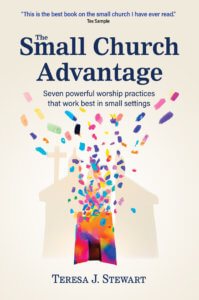Teresa Stewart has faith in the future of small congregations because she has faith in a God who shows up even in small and forgotten places. She believes that small churches are critical learning laboratories as the church navigates a future far too complex for one-size-fits-all patterns of ministry.
Let’s start with this fundamental agreement about worship. It’s a truth Christians share whether we describe our worship as contemporary, traditional, hybrid, or house. It’s our common commitment, even without a common denomination or affiliation. It holds up regardless of whether we order worship in two, four, or six parts. And it’s true whether we worship alongside 12 or 20,000. God — the author of life, beyond all space, time, and reason — comes to be with us.
In worship, God joins us. Just as we are. Right where we are. Wherever we are. Christian worship isn’t simply a messaging opportunity for the gathered. Or a who-does-it-best performance. Or some kind of think-about-this event. Christian worship is nothing less than a divine-human encounter. An actual meet-up between God and God’s people. God present — for a local, mutual exchange of communication and gifts. God present — to grow a gracious, unimaginable relationship between the High Holy and the Right Here.
God shows up in small and forgotten places.
Jesus promised, “I am with you” whenever two or three are gathered in his name (Matthew 18:19-20). But this promise was not some new divine initiative. Scripture is thick with the indiscriminate intimacy of divine love. God shows up in glorious temples. But God also chases after us in dusty traveling tents. God meets us in the rubble of what used to be a glorious temple. But also joins us at ordinary dinner tables. And in stale underground tombs. Divine love demonstrates a wildly reckless disregard for ideal settings and “perfect” people.
All of this means that small congregation worship matters. Not once it improves the music and preaching. Or when it better imitates the practices of big congregations. Or when the attendance numbers make it worth God’s RSVP. Small congregation worship matters for this simple, essential, primary, theological reason: God shows up.
Small congregation worship matters to all worshipers.
But there’s more. Small congregation worship doesn’t simply matter to small congregation worshipers. It matters to all worshipers. The salvation story can’t be told without an enormous range of divine show-up stories. Scripture even insists that God has a peculiar preference for doing new things in small settings, unexpected places, and with unlikely people. God shows up in crowded city centers. But also on lonely wilderness roads. God shows up for big gatherings like the 5,000 folks fed with miraculous bread, fish, and hope. But also for small disruptions — like the woman pouring out pricy perfume for a priceless truth. God shows up for large faithful bunches. But also for scoundrels like Jacob, disrupters like Ruth, wafflers like Nicodemus, and uppity outsiders like the Canaanite woman.
Apparently, we need all these divine encounters to see how far God is willing to go to be with us. We need small, unexpected, and unlikely encounters to grasp the fullness of the good news. Or perhaps so it can grasp us.
Small congregation worship matters to the future of the whole church.
There’s still more. Small congregations also matter to the future of the whole Church — in all places. Really? Small congregations are crucial local laboratories. They are places of indigenous experimentation. Small congregations are diagnostic centers tasked with figuring out what the good news sounds like and looks like in each community. To help grow the kingdom in the years ahead.
Outrageously, some small, unexpected, unlikely experiments work. And from these experiments, we end up with more local models. More indigenous innovations. For more people. In more places. And with a greater diversity of forms and practices. God shows up.
Currently, we are abundantly confident in the successes of our large congregations. And our confidence may be changing the rules especially in the United States. We may be preserving and replicating general worship models that work in well-resourced, large settings. And overlooking everything else — like the messy, unpredictable particulars of small settings. We are not exploring how large and small congregations might work differently, then teaching the strengths of each. Instead, we are looking for successful, one-size-fits-most answers with a troubling result: we are gathering all the kingdom’s eggs into one big basket. And missing the margins and edges where local ministries might be incubating unnoticed.
Please note. This is not a plea to save all small congregations. Human organizations have life cycles. Not all can or should be saved. There are unhealthy congregations of all sizes. Instead, this is a call:
- To unleash small congregations — differently.
- To see God present in the workings of small congregations — differently.
- To reimagine worship through small congregations’ distinctive communities — differently.
- To make small congregations (again) local laboratories, indigenous innovators, and good news diagnosticians.
Answering this call won’t be easy. It will take us to unexpected, unsettled, untidy edges (as it always has). It will require experimenting, flailing, and learning. And we will have to learn how to do this work with and not simply for small congregations. So we don’t return to merely replicating one model.
The historical pattern is pretty clear. Some small congregations and unlikely ministries will resource the Church through the next great transition. Ultimately, returning to the practices of local laboratories should feel familiar to the Church. It’s rooted deeply in our tradition and incarnational theology. It also resonates with God’s outrageous preference for doing new things with scoundrels, wafflers, and uppity outsiders.
 Adapted from The Small Church Advantage: Seven Powerful Worship Practices that Work Best in Small Settings (Market Square Books, 2023) by Teresa J. Stewart. Used by permission. The book is available at Market Square Books, Cokesbury, and Amazon.
Adapted from The Small Church Advantage: Seven Powerful Worship Practices that Work Best in Small Settings (Market Square Books, 2023) by Teresa J. Stewart. Used by permission. The book is available at Market Square Books, Cokesbury, and Amazon.
Related Resources
- Creating Powerful Worship in Small Congregations featuring Teresa Stewart — Leading Ideas Talks podcast episode | Podcast video | In-depth interview
- Revitalizing Worship is More than a Question of Style by Donna Claycomb Sokol and L. Roger Owens
- Small Church Big Impact by Blake Bradford






